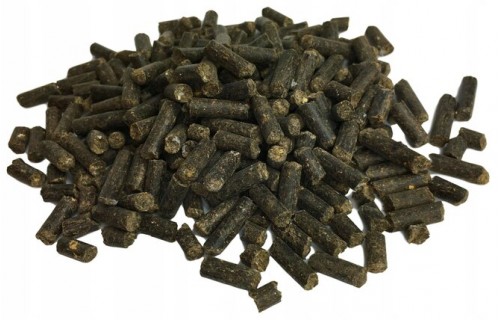Obornik granulowany. Peletowanie obornika. Zalety stosowania obornika granulowanego

Obornik to wysokowartościowy nawóz organiczny dostarczający podstawowych wartości odżywczych takich jak azot (N), potas (K) czy też fosfor (P) niezbędnych do prawidłowego wzrostu roślin. Powstaje z mieszaniny odchodów zwierząt gospodarskich i ściółki. Dostarcza też roślinom innych składników pokarmowych niezbędnych do rozwoju takich jak wapń, sód, magnez, siarka, mangan, bor czy cynk.
Ze względu na zawartość substancji organicznej, bardzo
dobrze wpływa też na poprawę struktury gleby. W procesie przemiany masy
organicznej powstaje w glebie próchnica oraz następuje rozwój korzystnej dla
gleby mikroflory bakteryjnej. Poprawa poziomu próchnicy zwiększa również
pojemność wodną gleby.
Rodzaje obornika ze względu na pochodzenie:
- obornik bydlęcy
- obornik kurzy
- obornik koński
- obornik świński
- obornik owczy
- obornik gołębi i wiele innych.
Wyróżnia się również obornik sztuczny, powstający w procesie
kompostownia sieczki słomianej
z gnojowicą, gnojówką z dodatkiem nawozów mineralnych (np. N, P, CA) oraz z
dodatkiem specjalnych preparatów. Obornik sztuczny nie ustępuje pod względem
wartości nawozowych obornikowi naturalnemu.
Rodzaje obornika ze względu na postać
Możemy rozróżnić kilka podstawowych postaci obornika:
- obornik naturalny (świeży/surowy) – pochodzący wprost od
zwierząt (składający się ze ściółki, kału
i moczu zwierząt). Zawiera toksyczny amoniak i jest silnie skoncentrowany. Może
również zawierać nasiona np. chwastów, różnorodne patogeny chorobotwórcze czy
też pasożyty. Ma też intensywny nieprzyjemny zapach.
- obornik kompostowany – obornik naturalny składowany w
przeznaczonych do tego składowiskach w którym zachodzą korzystne procesy
fermentacyjne (np. płyta gnojna)
- obornik suszony – jest to obornik kompostowany, w którym zredukowana
została ilość wody w masie. Nie posiada nieprzyjemnego zapachu.
- obornik granulowany (pellet nawozowy) – optymalna postać
obornika. Obornik poddany jest procesowi technologicznemu, którego produktem
końcowym jest pellet nawozowy w postaci obornika granulowanego. Jest to
optymalna postać nawozu organicznego tak ze względu na parametry
fizyko-chemiczne, stabilność mikrobiologiczną, jak też komfort aplikacji nawozu
w gospodarstwach wielkotowarowych, małych i średnich gospodarstwach rolnych czy
też
w przydomowych uprawach amatorskich.
W trakcie procesu technologicznego produkcji obornika
granulowanego produktem wejściowym jest obornik kompostowany o odpowiedniej
wilgotności.
Pierwszym etapem jest rozdrobnienie obornika kompostowanego do odpowiedniej
frakcji, przy użyciu np. młynów bijakowych firmy TechnoMaszBud serii KRAFT lubMB. Następnie rozdrobniona masa poddana jest suszeniu w stosunkowo wysokiej
temperaturze np. w aerodynamicznej suszarni serii SA. W trakcie suszenia, pod
wpływem wysokiej temperatury, giną nasiona chwastów, patogeny chorobotwórcze
czy też pasożyty, jakie pozostały po procesie kompostowania. Następnie
rozdrobniony i wysuszony obornik formowany jest przy użyciu granulatora/peleciarki
TechnoMaszBud wchodzącej w skład linii do produkcji pelletu np. z rodziny LDG. Tak
uformowany obornik w postaci pelletu nawozowego może być poddany kalibracji i
schłodzeniu z użyciem przenośnika taśmowego PT-500 oraz konfekcjonowaniu w
opakowania wg potrzeb rynkowych (np. opakowania 5, 10 lub 15 kg lub typu BIG
BAG) przy pomocy wagopakowarki np. WP-600.
Mocne strony stosowania nawozu w postaci granulek
Obornik granulowany jest bezpiecznym produktem naturalnym o
uniwersalnym zastosowaniu, różniącym się ilością poszczególnych składników
pokarmowych ze względu na ich pochodzenie.
Produkt dostarczany w postaci pelletu można składować w suchych i przewiewnych
pomieszczeniach do 3 lat. Aplikacja może odbywać się od wczesnej wiosny do
późnej jesieni w trakcie całego procesu wegetacyjnego. Obornik w postaci
pelletu nawozowego jest łatwy do rozrzucania ręcznego jak
i maszynowego. Nie wydziela nieprzyjemnego zapachu. Obornik granulowany po
aplikacji, pod wpływem wilgoci, pęcznieje, a następnie rozkłada się dostarczając
roślinom składniki pokarmowe poprawiając strukturę gleby.
Oprócz aspektu bezpieczeństwa stosowania obornika
granulowanego w zakresie aktywnych nasion chwastów, patogenów czy też pasożytów
istotny jest też komfort aplikacji w porównaniu do obornika naturalnego.
Obornik granulowany pozwala na znacznie szybszą i tańszą aplikację w
gospodarstwie przy użyciu standardowych siewników do nawozów.
Zużycie obornika naturalnego to około 20-30 ton na hektar,
przy konieczności użycia specjalistycznego roztrząsacza do obornika, w okresie
jesiennym, z koniecznością natychmiastowego przeorania. Natomiast zużycie
obornika granulowanego to zaledwie 1-2 ton na hektar, z aplikacji od wiosny do
jesieni, w trakcie całego okresu wegetacyjnego, z możliwością pozostawienia
granulatu na powierzchni gleby i stopniowym uwalnianiu składników pokarmowych
do gleby, bez ryzyka zainfekowania patogenami, pasożytami czy też rozsianiem
chwastów.
Przyjmuje się, że 1 tona obornika granulowanego powstaje z
przerobienia około 10-15 ton obornika naturalnego/surowego.
Granulatory firmy TechnoMaszBud
serii GMK, RTH i Prime z powodzeniem
sprawdzają się w produkcji gotowych nawozów.


